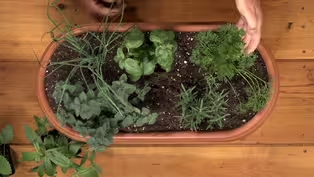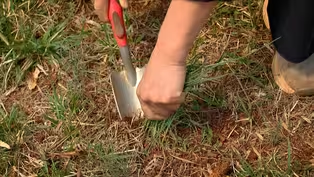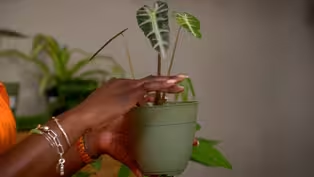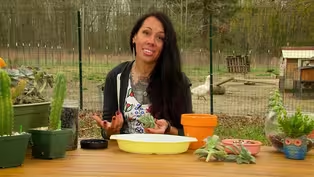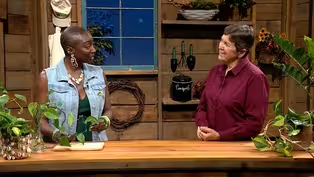Virginia Home Grown
Growing Herbs
Clip: Season 25 Episode 2 | 7m 37sVideo has Closed Captions
Visit a colonial-style herb garden to learn about plants for the kitchen and beyond
Peggy Singlemann visits the Hanover Herb Guild’s garden at Sycamore Tavern in Montpelier to talk with Crystal Delk about growing herbs and their uses for the kitchen and beyond and learn the QR tag system used in the garden. Featured on VHG episode 2502, April 2025.
Problems playing video? | Closed Captioning Feedback
Problems playing video? | Closed Captioning Feedback
Virginia Home Grown is a local public television program presented by VPM
Virginia Home Grown
Growing Herbs
Clip: Season 25 Episode 2 | 7m 37sVideo has Closed Captions
Peggy Singlemann visits the Hanover Herb Guild’s garden at Sycamore Tavern in Montpelier to talk with Crystal Delk about growing herbs and their uses for the kitchen and beyond and learn the QR tag system used in the garden. Featured on VHG episode 2502, April 2025.
Problems playing video? | Closed Captioning Feedback
How to Watch Virginia Home Grown
Virginia Home Grown is available to stream on pbs.org and the free PBS App, available on iPhone, Apple TV, Android TV, Android smartphones, Amazon Fire TV, Amazon Fire Tablet, Roku, Samsung Smart TV, and Vizio.
Providing Support for PBS.org
Learn Moreabout PBS online sponsorship>>So the Sycamore Tavern has been here since 1799.
It served as a stagecoach stopover.
>>Cool.
>>For people on their way to the Blue Ridge mountains.
>>Yes.
>>And over years, it's been a lot of different things.
It's been an inn.
Of course, it's a tavern.
And it's been a private home.
>>Okay.
>>And now, it's a library that houses historical data.
The Page Memorial Library's been here for over 80 years.
>>That's a great history.
What a wonderful reuse of the building continually, from 1799.
>>Yes.
>>But I'm sure the garden on the back of the building doesn't date back to 1799.
>>It does not.
There was a garden here before the garden that you see before us.
And the Hanover Herb Guild, a group of ladies who got together and formed the Herb Guild in 1999, decided that they were gonna restore the garden.
However, when they started doing some research and planning, they realized that they should reflect the age of the tavern in the garden.
>>Good decision.
>>And here you have the Colonial Herb Garden.
>>Crystal, this is a perfect size.
I love it.
>>It is, all right.
>>Let's grab a seat.
I like that, nice bench.
Well, you were saying earlier that somebody had come by and- >>Yes, that's right.
One day when I was working here in the gardens, doing the maintenance that the Herb Guild does, two women stopped by to talk.
And they told me that they, when they regularly walk around the herb gardens, that they always stop by to see it.
And so it was really exciting, because they said, "Thank you to the Herb Guild ladies for caring for the garden."
>>You know, it's so nice to be appreciated and it's so nice for people to come and just acknowledge what you're doing.
And this is a beautiful garden.
So what is the layout of this garden?
>>So this is a typical colonial style garden parterres.
There are four parterres on the outer perimeter of the garden, and then there's this little square one in the middle.
So the square one in the middle, we usually put seasonal plants.
And so we just are finished with our daffodils.
>>Right.
>>But we have a fragrance garden, we have a culinary garden, we have a medicinal garden, and we have a- >>A household garden.
>>Thank you.
(Peggy laughing) A household garden, yes.
The plants that are in it are typical plants that you might've found in a colonial garden in the day.
>>Right.
>>And you know, in those days, they couldn't go go the pharmacy.
They couldn't go to the store.
So they would just go out in their garden and snip some herbs and, you know, use them as they were, maybe potpourri, or they would put them in a tincture for medicinal purposes.
>>Or even use it to dye their clothes or whatever, yes, yes.
>>Yes, exactly, yes.
>>But which is your favorite style of herbs?
>>Well, I love parterre gardens, but my favorite herb is burnet.
>>Ah, you like- >>Because- >>The culinary herbs.
>>It's a beautiful herb.
It looks like a shrub.
It's so pretty.
And it goes right through the winter.
So.
>>Yes.
>>Sometimes if you need something to garnish a plate, you just run out into the garden, cut a few pieces, and put it on a plate, it's beautiful.
>>Well, I love growing it, 'cause when I'm out in the garden, I can take a little snip, put it in my mouth, and I get this lovely cooling cucumber sensation.
>>Yes.
>>And it's a great plant to sorta like sustain me a little bit longer.
>>Yes.
>>It's a wonderful one.
But what are some of the ones that would be used for potpourri possibly?
>>Well, you could use Santolina, I think.
You could use the lavender, rosemary maybe.
>>Yes.
>>That's a really nice plant to smell.
>>Yeah, 'cause people forget that we bathe regularly.
(Crystal laughing) And back then, it wasn't as often.
(laughing) >>That is true, yes.
>>And also, you know, we just, these scents also would help keep insects out of the house and things like that.
>>They did.
And sometimes they would even put, so we have one called Costmary, and that herb, they put the leaves of the plant in pages of the Bible so the insects didn't eat the paper.
>>Isn't that amazing?
>>It is.
>>Yes, yes.
You know, I notice everything is IDed in here.
So what system are you using?
>>Well, a few years back, we noticed that many of our members were all getting older.
And so some of our members have even moved away.
So we used to give garden tours, and now we're not always available.
So we heard about this product called Plants Map.
And we decided that we would do that.
So we raised money with our annual plant sale, and we started putting these in our garden.
So they're QR codes on aluminum sign plates, and visitors can come in and take a self-guided tour.
They just bring their smartphone, scan the QR code, and they get a description of the plant, a photograph when it's at its best, and they can learn about the garden on their own.
>>That's excellent.
So this way, they can come here, learn about plants, and go home and plant them.
>>Yes.
>>Exactly.
What are the challenges of this garden, though?
>>Well, we have a lotta shade here.
So you may have noticed.
>>Oh, yes.
(laughing) >>So when they put in the garden, of course, the trees were younger.
Because the garden was put in in 2000.
>>Yes.
>>And they had their grand opening in 2006, so it's been here over 25 years.
>>Yes.
>>The trees have grown, and so has the shade.
>>Ah.
>>So it's a real challenge.
So we, you know, we prune the plants to look their best as they can look.
We put in fresh plants when we need to.
And of course, the annuals, well, you know, you might not have a basil plant that that's this high and this big around.
But you have a basil plant that people can see, they can touch, smell, and enjoy.
>>Actually yes, and I see you've got thyme here, and that can handle the shade.
>>Yes, yes.
>>And the St. John's wort can handle the shade.
>>Yes.
>>So there are some herbs that will actually handle the shade better, part shade, we'll say.
>>Yes, yes, yes.
>>Rather than full sun.
>>Well as a matter of fact, one of my favorite herbs is the nasturtium.
>>Yes.
>>And I had in my own garden in full sun, as on the label, and oh my goodness, it couldn't take the southern summers.
>>No, they can't.
>>So I put it in a place that gets afternoon shade now, and it goes through the whole summer looking beautifully.
>>Yes, and many people just don't realize that if you give nasturtiums, as well as things like lettuce, a little bit of shade in the afternoon during the summer months, they'll thrive.
They just can't take that heat.
So I'm so glad you discovered that.
>>Like us in the shade in the afternoon, yes.
>>Exactly.
(laughing) We thrive too.
>>(laughing) Yes.
>>Herbs do require special soil, particularly in our clay soil here.
>>Oh, absolutely.
>>So were changes made here?
>>Yes, the soil is pretty well-draining, and that's what you need.
You know, when you have a home garden- >>Yes.
>>You have to put in the soil that's well-draining for these herbs, because they like it dry.
>>Yes.
>>And they don't like it wet.
>>No, they don't.
>>And our clay soils are not really hospitable to herbs.
>>Not at all.
>>So with the raised beds, it really is a help, because then you get to choose what kinda soil you put in those parterres.
So this is a great garden for that.
>>It would be, plus you need to make sure your pH is up, because herbs do not like our acidic soil here.
So they want it to be more of a neutral pH.
And I'm sure, because of the health of these plants, that you're monitoring that as well.
>>Oh yes.
>>So here we are in spring.
What's the next step for this garden?
>>Well, the Herb Guild is taking on sort of a renovation project.
So as you can see, when you walk around the garden, some of the herbs have been here a very long time.
>>Yes.
>>The perennials.
They're getting woody, misshapen.
So we are actually gonna be replacing some of the herbs that have been here for years.
>>People don't realize, not every plant lives forever.
And that every few years, people took cuttings of their plants, rooted 'em, and replanted them so that those older plants could be put into the compost pile.
>>And sometimes even when you take cuttings to use the plant, it's not as good, because it's woody or, you know, it's just not as good as it was from a young plant.
>>Exactly.
I hate to say it, but the older plants get, they change.
>>Yes.
>>Yeah.
Crystal this has been very, very enlightening to have such a nice, beautiful garden tucked behind a very historic building.
That it represents the building, but also that people can come here and learn totally whenever they want to.
>>Exactly.
>>Because of those QR codes.
>>Yes.
>>So I thank the Guild for their forward thinking and use of technology on something that's so well-established for many centuries, an herb garden.
>>Our pleasure.
(cars whooshing)
Video has Closed Captions
Clip: S25 Ep2 | 6m 31s | Learn how to grow herbs for your kitchen in containers (6m 31s)
Video has Closed Captions
Clip: S25 Ep2 | 3m 1s | Discover edible spring plants that grow wild in almost any yard (3m 1s)
Video has Closed Captions
Clip: S25 Ep2 | 7m 27s | Discover popular houseplant varieties and learn about their care (7m 27s)
Video has Closed Captions
Clip: S25 Ep2 | 3m 5s | Discover how easy it is to propagate succulents to share with friends (3m 5s)
Video has Closed Captions
Clip: S25 Ep2 | 6m 29s | Learn about propagating houseplants and get crafty ideas for decorating containers (6m 29s)
Providing Support for PBS.org
Learn Moreabout PBS online sponsorship

- Home and How To

Hit the road in a classic car for a tour through Great Britain with two antiques experts.












Support for PBS provided by:
Virginia Home Grown is a local public television program presented by VPM
